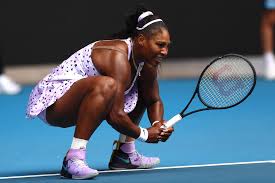Serena Williams has established herself as one of the most decorated players in the history of women’s tennis but there is still one record that continues to elude her.
It has been more than three years since the 38-year-old defeated sister Venus to triumph at the Australian Open and claim her last Grand Slam title. The milestone elevated her to a single trophy away from drawing level with Margaret Court for most grand slam singles title ever won by a man or woman. At the time of her Australian victory, it seemed that it was only a matter of time before Williams would level and even break Court’s record, but this has failed to happen so far.
Shortly after claiming grand slam No.23, Williams took time off the Tour due to pregnancy and the birth of her daughter Olympia. When she returned to action, there were still glimmers of the player who had dominated the WTA Tour. However a combination injury setbacks and lack of consistency has resulted in nothing but frustration in the big events.
“It was a tremendous effort to come back and reach all four grand slam finals after becoming a mother at the age of 37,” Williams’ coach Patrick Mouratoglou told UbiTennis.
“I’ve never seen anyone work as hard as that, it was incredible. Her motivation is incredibly high and her disappointment is as big as her motivation when she lost those finals.”
Williams has featured in four out of the last seven grand slam finals, but has lost them all in straight sets to different players. Including her controversy-stricken US Open clash with Naomi Osaka in 2018 and a comprehensive loss to Simona Halep at Wimbledon last July. Besides the impressive play from those who beat her, is there something more significant that is hindering Williams?
According to Mouratoglou, who has worked alongside Williams since 2012, he admits pressure is a factor on the seemingly resilient player. The Frenchman believes the task of trying to equal Court’s record is ‘the greatest pressure’ an athlete can experience. Although Williams has on previous occasions played down the idea of nerves being the reason for her losses. Instead praising the performance of her opponent.
“I think it is normal that the pressure is at a peak that she has never reached before because she is playing one match for history. That is the greatest pressure anyone is any sport can experience,” he said.
“When the pressure is too big for you it highlights some of your weaknesses.’
“Physically we (Williams’ team) could see that she was not back 100 percent. It was not obvious in the other matches, but when the pressure was on it was more.”
Not all down to Serena
It is unfair to suggest that the reason for Williams’ series of losses in the finals is solely down to her when you take into account the calibre of player she was facing. Three out of her four losses were to women who are currently ranked inside the top 10 on the WTA Tour. The only exception is world No.21 Angelique Kerber, who claimed the Wimbledon title back in 2018.
“I think she was unlucky because in all four grand slams she played a player who had nothing to lose and played the best match of their life,” Mouratoglou reflects.
“When you’re under pressure, you don’t play well and nervous you might still have a chance to come back. But if your opponent plays the match of their life then you don’t and I think that is what happened.”
Perhaps the loss that hurt the most for Williams took place on the grass courts at the All England Club. Last July she rallied to the final by dropping just two sets in six matches played. Awaiting her in the title match was Halep, whom she led 9-2 in their head-to-head. Williams was the odds on favourite against the Romanian, but suffered a 6-2, 6-2, loss.
Halep conjured up a comprehensive game plan of taking the ball early and not allowing her nemesis to dominate play. Impressing the Wimbledon crowd and leaving Williams settling for runner-up once again.
“We all knew that Halep never thought she would win Wimbledon in her life. So she has no expectation, which is the ideal situation to be in,” Mouratoglou said of the world No.2.
“Probably at the start of the match she felt that Serena was really nervous. I think this was one of the matches she was the most nervous in. She hit a few shots that almost went under the net and I think Simona felt so free. She hit a few great shots on difficult points.” He added.
The job for the Williams contingent is trying to come up with a way to overcome this barrier. In January the former world No.1 looked to be back to top form by winning the ASB Classic in New Zealand. Her first title of any sort since becoming a mother. However, it would be another disappointment at the Australian Open. This time losing in the third round to Wang Qiang.














